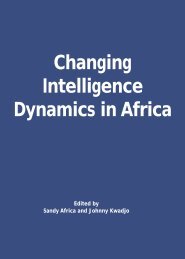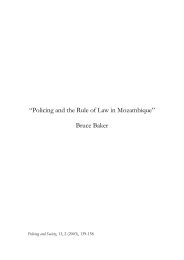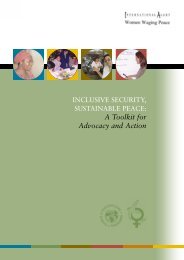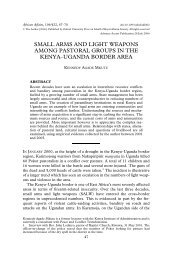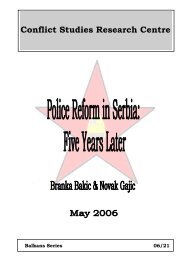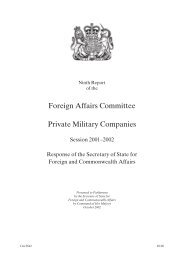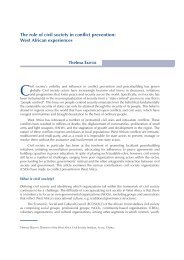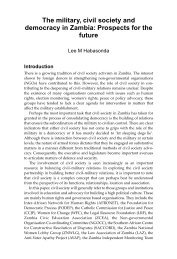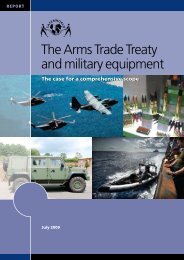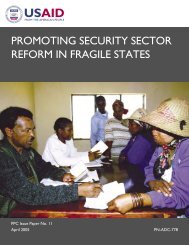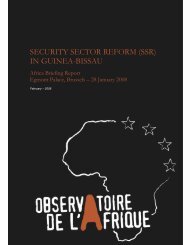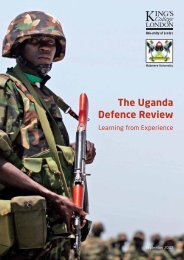AFGHANISTAN'S ELECTION CHALLENGES
AFGHANISTAN'S ELECTION CHALLENGES
AFGHANISTAN'S ELECTION CHALLENGES
You also want an ePaper? Increase the reach of your titles
YUMPU automatically turns print PDFs into web optimized ePapers that Google loves.
19<br />
Afghanistan’s Election Challenges<br />
Crisis Group Asia Report N°171, 24 June 2009 Page 9<br />
law, agreed upon in February 2009 and presented to the<br />
president. Karzai has refused to approve it, apparently<br />
arguing that such a provision is unconstitutional because<br />
the constitution does not explicitly provide for such<br />
oversight. Since checks can promote impartiality and<br />
greater confidence in election commissions such intransigence<br />
would appear unwarranted. Even if the law<br />
is not technically passed in time for the 2010 polls, the<br />
elected president would be wise to put IEC nominees<br />
before the Wolesi Jirga for approval before prepara-<br />
tions begin in earnest for those elections.<br />
Changes in the new law as it emerged from the National<br />
Assembly also sought to sensibly stagger the<br />
appointments of commissioners to ensure a mix of<br />
experience and fresh approaches. It further stipulated<br />
that local election officials must belong to different<br />
areas than the ones they would oversee. Concerned<br />
this would be difficult to implement, the IEC also<br />
pointed to a loss of local knowledge and contacts. Such<br />
a provision, however, reflects wide public disquiet at<br />
perceived bias by, and potential pressure on, staff<br />
working in areas where they have close ties.<br />
the previous law was widely ignored, a far more detailed<br />
procedure should have been created for verifying that<br />
political parties did not have armed wings.<br />
In any event the president rejected the law over a provision<br />
that political parties could have offices abroad<br />
and the government must provide security for them.<br />
Since political parties are integral to any functioning<br />
democracy, the law needs to be substantively revisited.<br />
B. 10ELECTORAL INSTITUTIONS<br />
The 2009-2010 elections will be the first post-Taliban<br />
polls held under Afghan lead. 66 Strong, independent<br />
election institutions are essential to spearhead preparations<br />
and counter political interference. Afghan<br />
electoral bodies consist of the Independent Election<br />
Commission (IEC) that oversees the process and the<br />
Electoral Complaints Commission (ECC) which deals<br />
with “offences, complaints and challenges”. 67 Unlike<br />
previous elections the international community’s formal<br />
role is only to assist and advise.<br />
3. The Political Party Law<br />
1.<br />
20The Independent Election Commission<br />
Although they lack a substantial place in the broader<br />
electoral framework, the numbers of political parties<br />
have continued to grow, with 102 registered with the<br />
justice ministry by April 2009. 64 The new Political<br />
Parties Law, passed by both houses of the National<br />
Assembly in 2008, aimed at restricting the growth of<br />
what are often little more than leadership vehicles by<br />
raising the required number of registered members<br />
from 700 to 10,000. The bill still required groups to<br />
register with the justice ministry when an independent<br />
entity would have been more appropriate. It also<br />
failed to tackle a number of legal impediments to<br />
safeguard robust pluralism.<br />
The vague test in the earlier law stating that parties shall<br />
not “incite to ethnic, racial, religious or sectional violence”<br />
was weakened even further to simply inciting<br />
“biases” on any of those grounds. A bar on parties that<br />
“pursue objectives that are opposed to the principles<br />
of the holy religion Islam” remained. 65 These provisions<br />
are a potential weapon against minority groups or those<br />
deemed “non-Islamic” trying to form parties. Meanwhile,<br />
little attention was paid to strengthening the ban<br />
on political parties with “military organisations or<br />
affiliations with armed forces”. As this provision in<br />
64 “List of Licensed Political Parties”, justice ministry,<br />
www.gov.af, accessed 19 April 2009.<br />
65 Article 6, draft Political Parties Law (2008) as rewritten<br />
by the Wolesi Jirga April 2009.<br />
The IEC is composed of a board of seven commissioners,<br />
which sets policy and oversees the technical<br />
preparations of the IEC Secretariat (IEC(S)) headed<br />
by a chief electoral officer. The IEC(S) has 34 provincial<br />
offices divided into eight regions with 400<br />
permanent staff (230 core and the remaining support<br />
staff). On election day total staff will increase to<br />
165,000 in about 7,000 polling centres. 68<br />
As discussed, the IEC has been appointed solely by the<br />
president and its perceived partisanship is a major<br />
potential shadow over the legitimacy of the 2009-2010<br />
elections – something that donors should have been<br />
far more vocal about before making funding commitments.<br />
Karzai loyalist Azizullah Ludin was appointed<br />
to head the body in 2007 and has done little to challenge<br />
perceptions of his ties. He has, for instance, publicly<br />
criticised those who had spent long periods abroad for<br />
seeking to stand in the polls, presumably referring to<br />
such potential candidates as former finance minister<br />
Ashraf Ghani Ahmadzai and former interior minister<br />
66 The Joint Electoral Management Body (JEMB), a temporary<br />
institution established in 2003 comprising the Independent<br />
Election Commission and the UN electoral component,<br />
dissolved following the 2005 elections.<br />
67 Article 52, Electoral Law (2005).<br />
68 Crisis Group interview, Zekria Barakzai, IEC deputy<br />
chief electoral officer, Kabul, 15 May 2009.



